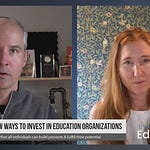In this end-of-season episode of Class Disrupted, Diane Tavenner and I came together in-person at the AI Show at the ASU-GSV Summit to reflect on the arc of our AI-focused sixth season. We discussed key themes and takeaways, including the enduring importance of foundational knowledge, skepticism around the speed and impact of AI-driven change within traditional schools, and how transformative innovation is more likely to emerge from new educational models outside the mainstream. Our conversation explored the challenges and opportunities AI brings, particularly in developing curiosity as a critical habit for learners, and we revisited how our own perspectives shifted throughout the season.
Michael Horn
Hey, Diane, it is good to be with you in person.
Diane Tavenner
It's really good to be in person. It's a little funny where we are in person, but it's kind of the perfect setting to end our AI you know, miniseries—season six. We are at the AIR show. I think that's what it's called, the AI show in San Diego.
Michael Horn
I'm gonna take a selfie, as we say.
Diane Tavenner
We're gonna send you a picture of this. So we're recording here from the floor that is filled with educators and edtech companies and AI. AI. AI!
AI's Educational Impact Outside Schools
Michael Horn
Because AI is the thing, which is perfect because our season this year has almost exclusively focused on the question of what will the impact of AI be in education? How do we shape that? What do we want it to be? All these questions, frankly, in ways that neither of us had imagined fully. I think when we started this and we did a first sort of rapid reaction.
Diane Tavenner
We did. Were we starting our kind of baseline assessment of what we thought and our knowledge and what we were curious about?
Michael Horn
Yep. And we've gone through this journey, and now today, we sort of get to tidy it up with our very sharp, insightful takes. No pressure on us.
Diane Tavenner
No pressure for those key headlines. But, you know, along the way, we interviewed a bunch of really interesting people, some skeptics, some really positive folks. And we benefited a lot from it.
Michael Horn
I learned a ton. My understanding of the space. I don't know if I conveyed it on our prior episode, but I think it's a lot deeper than it was when we started.
Diane Tavenner
For me, too. I really appreciate them. And then, you know, in true fashion, we just publicly processed out loud last episode.
Michael Horn
We do.
Diane Tavenner
And now we're going to try to actually pull it together with some key takeaways. So that's how we're going to wrap it today. And so we kind of outlined, you know, three big categories here. And the first one is, I want to ask you what belief was confirmed for you as we made our way through this season?
Michael Horn
Yeah. So people obviously heard where we started, but I will confess, I've been struggling. I knew you were going to ask this question, and for days I've been wondering, what did it confirm for me? I think I will say two things. If that. And maybe that's cheating. But it's our podcast. Right. So, number one, I think it confirmed for me that foundational knowledge will still be important.
Diane Tavenner
Yes.
Michael Horn
And I think developing it into skills will still be important, just as Google did not change that reality, despite What a lot of educators and maybe more schools of education sadly were telling their students that became teachers. I don't think AI will change that either. We had a long conversation in the last episode around the nature of expertise and who AI is useful for. I think the second thing that maybe hit harder for me but, but confirmed something that we talked about in the first episode was I think the most transformational use cases of AI in education will be in areas outside of the traditional schools with new models that leverage AI that wrap around it to do things very differently from business as usual, frankly. Like why you started public school is outside of the traditional. Right. I think the other piece of that is I'm somewhat skeptical that venture capital will be the thing that funds a lot of these new models that emerge.
Diane Tavenner
Say more about that. Why?
Michael Horn
Well, I could be very wrong in the latter. I'm just coming, we're at this conference and I just coming from a place where a few people said no, we are funding these things. So I could be completely wrong. I guess my thoughts are that the time frames for explosive growth for VC are short; five to seven years.
Diane Tavenner
Yeah.
Michael Horn
The microschools, the new emerging schooling models. I don't even know if microschools will be the word we use in five years from now. I'm not convinced those are like zero to a hundred thousand student businesses.
Listen to this episode with a 7-day free trial
Subscribe to The Future of Education to listen to this post and get 7 days of free access to the full post archives.













